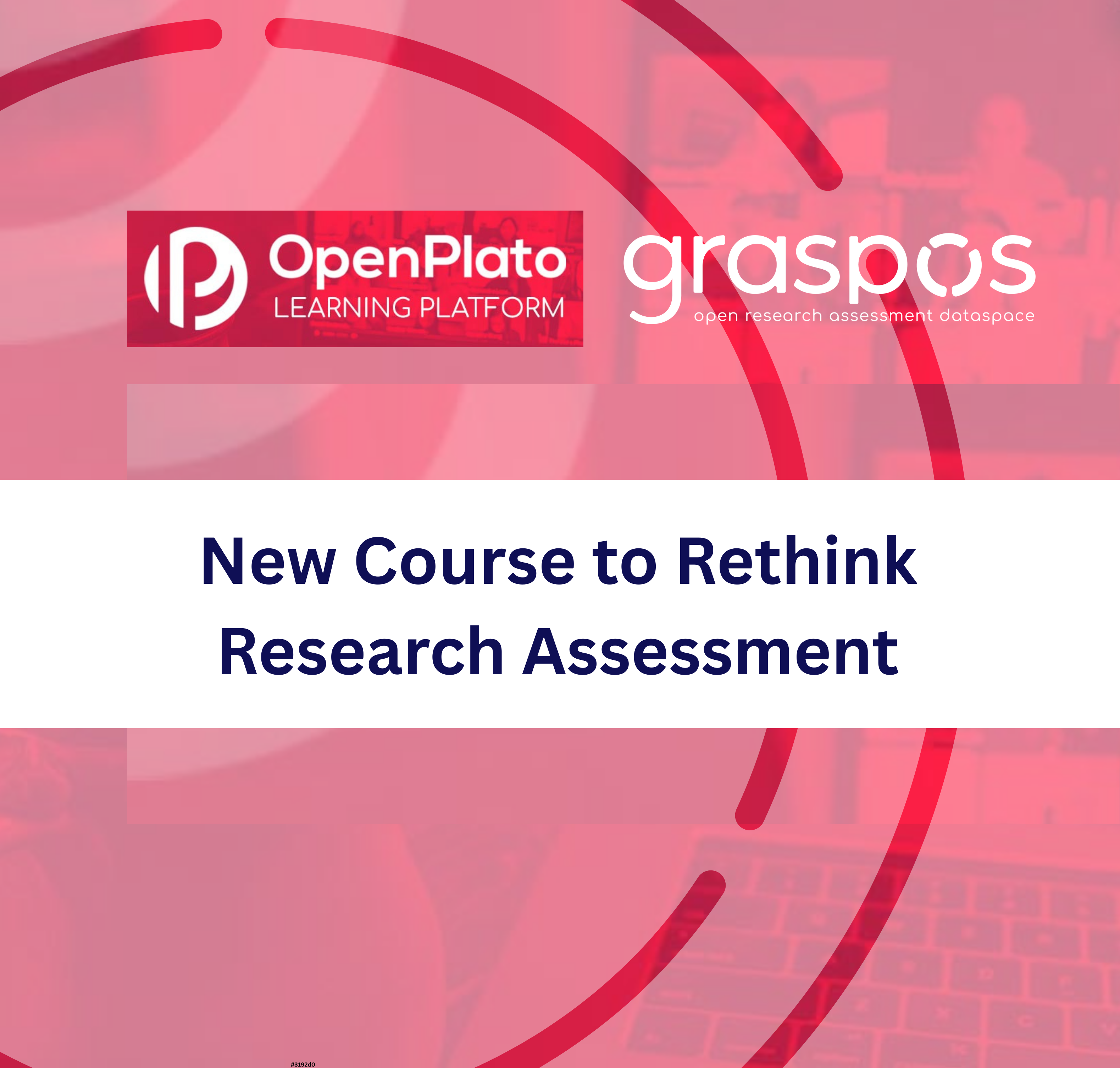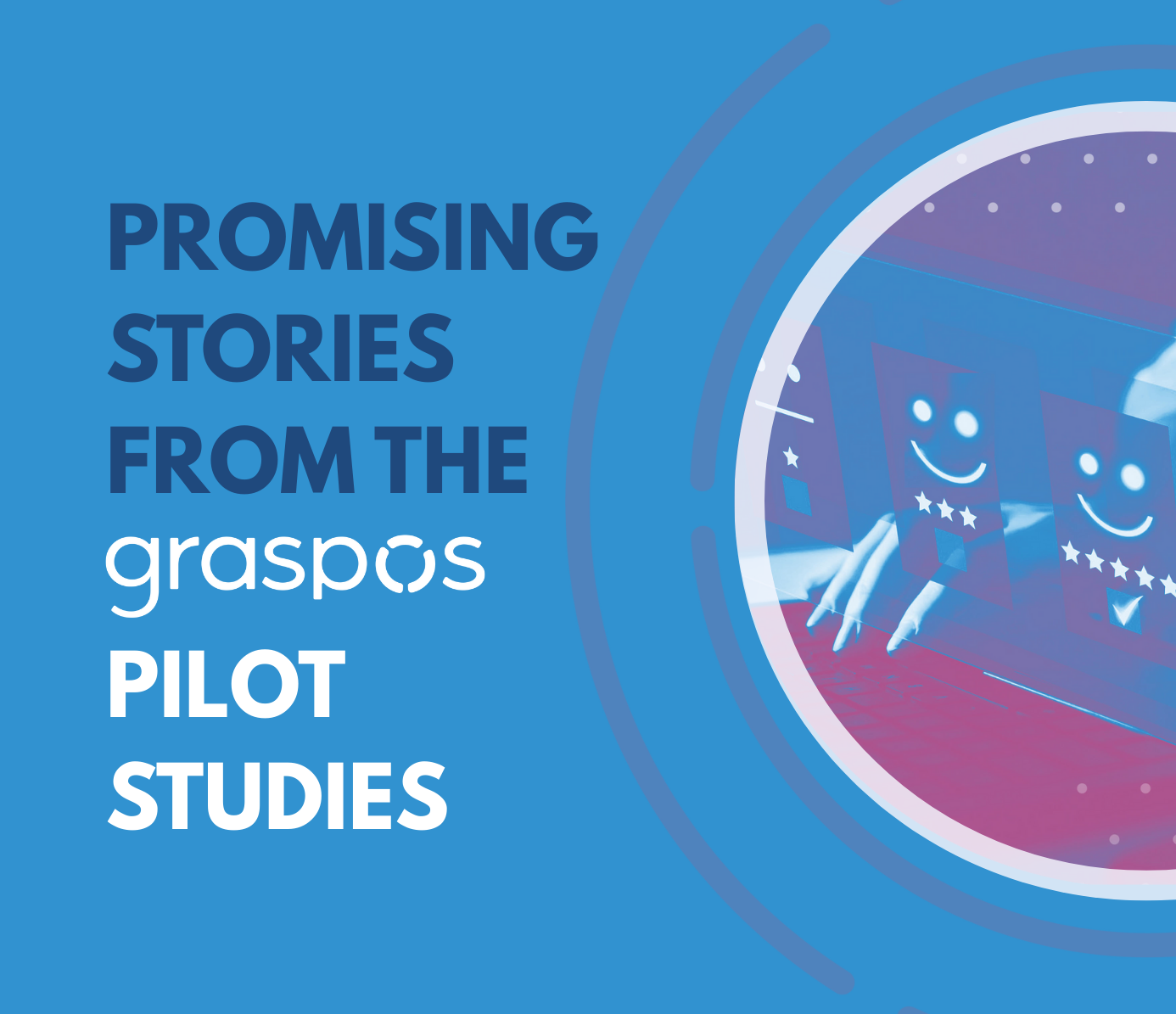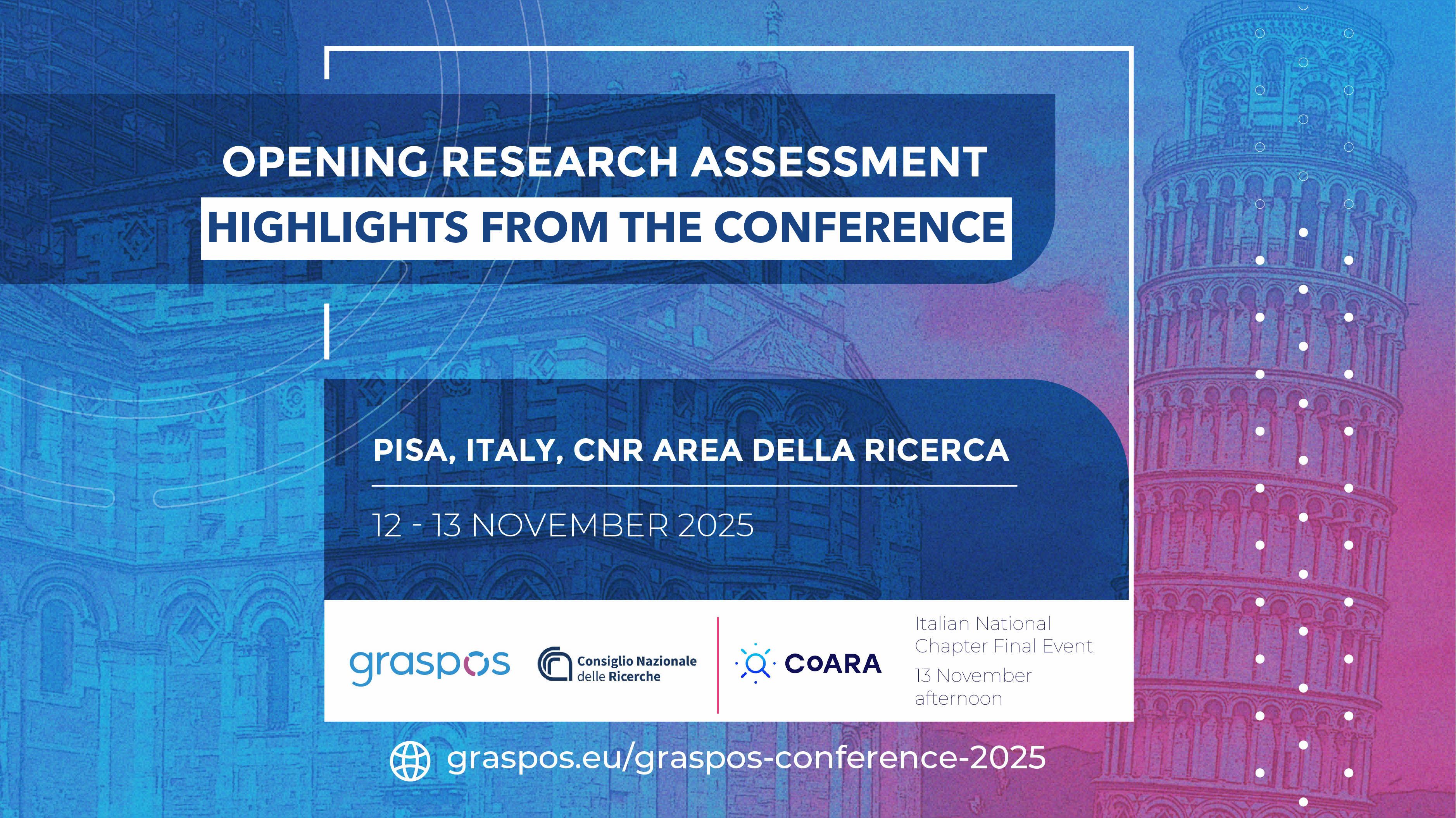GraspOS Chats #2 Get to know Giulia Malaguarnera
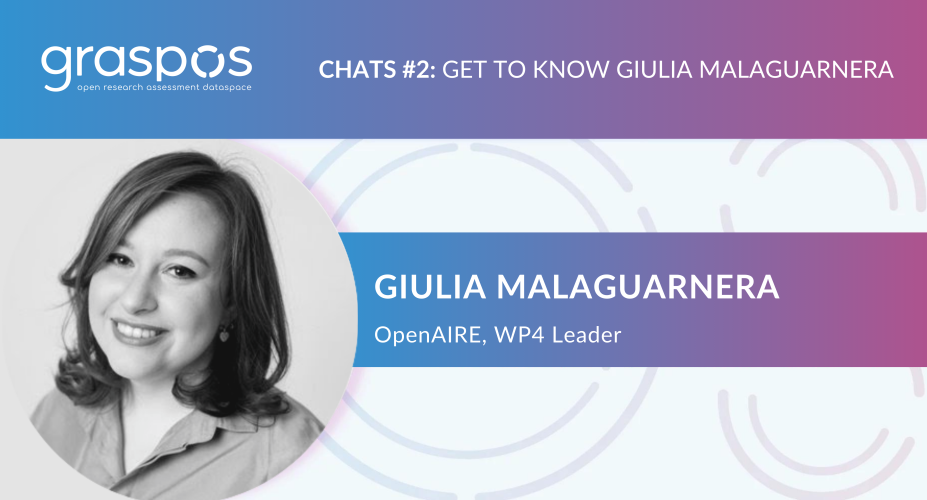
IN THIS SERIES OF INTERVIEWS WE FEATURE GRASPOS MEMBERS TO PRESENT THE PEOPLE BEHIND THE SCENES. WHAT IS THEIR ROLE IN THE PROJECT, THEIR BACKGROUND, AND THEIR VIEW ON THE NEED FOR AN OPEN SCIENCE-AWARE RESPONSIBLE RESEARCH ASSESSMENT SYSTEM?
In this edition, get to know Giulia Malaguarnera.
Giulia Malaguarnera works at OpenAIRE, a Non-Profit organisation which aims to ensure a permanent open scholarly communication infrastructure to support European research. Her role in OpenAIRE is to outreach and engage all actors in the Open Science ecosystem to enable them to practice Open Science.
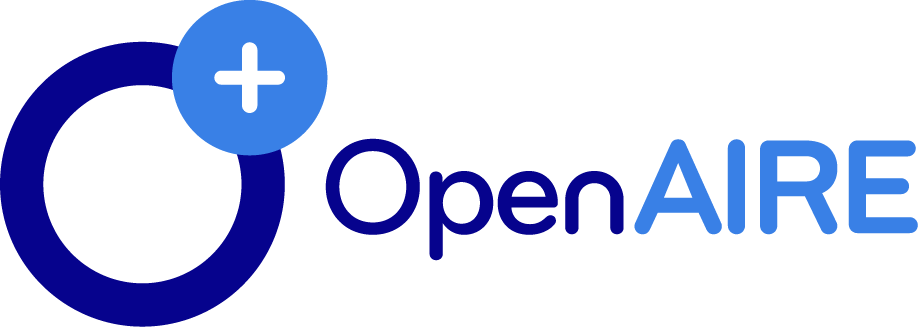
What is your role in the GraspOS project? What are your tasks and responsibilities?
I have been involved with GraspOS since the proposal writing stage. Currently, I am coordinating WP4, where we are designing a dataspace architecture to serve the needs of Responsible Research Assessment. In the project, I am also responsible for other subtasks, such as Outreach and Engagement activities, and providing support for training. Additionally, I contributed to the writing and coordination of the proposal for a Working Group in CoARA, titled “Towards Open Infrastructures for Responsible Research Assessment.” The goal of this group is to promote a broader reflection on Research Infrastructures, their principles, and their sustainability, with the aim of serving the research community beyond the scope of any specific projects.
What is your background in terms of previous work experience and academic discipline, and which specific perspective(s) does that background contribute to GraspOS?
My background is in Life Sciences: I hold a PhD in Neuropharmacology and an MSc in Pharmacy. Like many PhD holders, my academic career has not been linear, and my research interests have spanned various fields, including translational medicine, pharmacology, biotechnology, and now open science and research on research. I even had the opportunity to work for a start-up through the MSCA-Individual Fellowship (Horizon 2020) for two years before joining OpenAIRE!
One of the most relevant experiences for GraspOS was my Presidency of Eurodoc, the European Council of Doctoral Candidates and Junior Researchers, from 2020 to 2021. During that time, the European Commission invited me to provide the Early-Career Researchers' perspective on Open Science and Research Assessment. The results of my interventions and interviews on behalf of Eurodoc were included in the Scoping Report titled "Towards a reform of the research assessment system," which was published in 2021. Before and during my Presidency, I also volunteered for several independent projects that are relevant to GraspOS, including the "Identifying and Documenting Transferable Skills and Competences to Enhance Early Career Researchers Employability and Competitiveness" in 2018, the "Eurodoc input on UNESCO Recommendation on Open Science" that was incorporated into the final document of the UNESCO Recommendation on Open Science, a survey on postdoctoral researchers contributing to the OECD Report on Reducing the precarity of academic research careers, and in surveys on Open Science and Scholarly Communication awareness. Additionally, as part of the Marie Curie Alumni Association and drawing from my experience in the private sector as a PhD, I was interviewed by IDEA for the new release of ESCO, the multilingual classification of European Skills, Competences, and Occupations, which now includes researchers' skills and competences.
All these past experiences, coupled with my passion and vision for Open Science, drive me towards advocating for better Research Assessment and a transformation in the Research Culture, one that recognises and includes the diverse range of expertise among researchers for the betterment of policies, knowledge, innovation, and society.
What is your opinion on the need for an Open Science-aware research assessment system, and what are the challenges to achieving policy reforms?
The Open Science movement began over a decade ago, and gradually, it became evident that sharing research openly and at early stages would reduce academic misconduct stemming from the 'publish or perish' culture. The visionaries and pioneers of the Open Science movement stand as proof that embracing Open Science can enhance research reproducibility and transform the research culture. In such a culture, collaboration and achieving societal, economic, and scientific impact hold greater importance than simply aiming for a high h-index or Journal impact factor.
Even though the need for Open Science practices and global collaboration became apparent when the COVID-19 pandemic emerged, there were many misinterpretations of what Open Science entails and how it should be practised. The research community was unprepared to navigate this paradigm shift without adequate support, both in terms of infrastructure from institutes, awareness, training, and at the policy level. However, policymakers soon realised that Open Science must be prioritised, and that researchers should be rewarded in their career progression based more on the quality and impact of their work (scientific, societal, and economic) rather than the quantity dictated by journal impact factors, h-index, and the prevailing 'publish and perish' culture.
Can you talk to us about the activities you are currently working on in the project?
We are on the verge of releasing the initial framework of the GraspOS dataspace architecture, which comprises a plethora of services and tools aimed at measuring Open Science activities and practices. This dataspace will significantly enhance support for researchers in crafting their own curricula, identifying their strengths and weaknesses, while also providing valuable insights for Research Performing Organisations and Funders to gauge the progress toward Open Science adoption. Additionally, I am collaborating with colleagues on preparing training sessions and webinars for the project, as well as engaging in dissemination and outreach activities.
What are some of the most exciting aspects regarding the first developments of the project?
I'm excited about several aspects regarding the first developments of the project. One of the most thrilling aspects is witnessing the transition from a mere vision into a tangible and practical framework. The project is bringing together numerous complementary services that will play a pivotal role in shaping the dataspace for the European Open Science Cloud. I'm hopeful that these services will not only contribute valuable data to the dataspace but also pave the way for exploring effective strategies and principles, especially in collaboration with the CoARA Working Group. This collaboration holds the potential to amplify the impact of our efforts.
Moreover, it's worth noting that while our project is a small pilot, it is part of a much larger and fundamental societal and scientific challenge. This realisation brings a mixture of emotions – both excitement and apprehension. The challenge ahead might seem daunting, but it also presents an incredible opportunity to make a positive impact on the Open Science landscape. Embracing this journey, with all its uncertainties and potential breakthroughs, is both thrilling and humbling. I can't wait to see how our contributions will shape the future of Open Science and its broader implications for society and scientific advancement.
What is the one thing that you desperately need in your daily work routine?
Since I am Italian, I would typically go for the cliché of coffee, but alas, my Greek colleague Thanasis has already claimed it! So, I must settle for my next favourite thing: listening to music. It helps me keep the rhythm of my job tasks and stay focused throughout the day.
Giulia, thank you for the interview!

